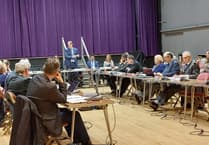Polling stations have opened – with voting now underway to elect new councillors at parish, town, borough and district councils across the area.
Below is a useful guide to what to expect when voting in person today (Thursday, May 4).
Who are the candidates?
If you’re asking yourself “who are these people listed on my ballot paper?”, here’s your answer...
We invited each candidate standing for election in all East Hampshire District Council wards (including Alton, Petersfield, Whitehill and Bordon) and selected Waverley Borough Council wards (in the Farnham and Haslemere areas), as well as Farnham and Haslemere town councils, to submit a profile of 100 words, explaining who they are and why they deserve your vote.
These can be found via these links:
East Hampshire District Council candidates here.
Waverley Borough Council candidates here.
Farnham Town Council candidates here.
Haslemere Town Council candidates here.
If you are unsure of which ward you live in, this should be included on your poll card – or failing that, put in your postcode online at https://www.writetothem.com/
Why isn't there an election in every parish and town council ward?
In many parish and town wards, not enough candidates put themselves forward to force an election. This is especially the case at parish level, but also at Alton, Whitehill and Petersfield town councils, many of whom will enter the new four-year election terms with councillor vacancies. These will likely be filled by 'co-option', that is sitting councillors voting on who they would like to fill the roles, without a public vote.
Where is my polling station?
If you have registered to vote, you should have received a poll card through the post from your local council. It will tell you where your polling station is.
Make sure you check your poll card before heading out to vote, in case your polling station has changed since you last voted. You can also find out where your polling station is on the Electoral Commission website, by entering your postcode.
Polling stations are open from 7am until 10pm. You can vote at any time within this window. And don’t forget, you need to go to your designated polling station; you can’t go to a different one, for example, near where you work.
Do I need to take anything with me?
Yes, you now need to bring an accepted form of photographic ID in order to receive your ballot paper. The full list of accepted forms is also available on the Electoral Commission website.
You can bring your poll card with you on the day, but this isn’t necessary, and it won’t be accepted as a form of ID. You can also bring your own pen or pencil if you prefer, but there will be pencils at the polling station as well.
What if I do not want my ID to be checked in public?
You can ask to have your ID checked in private. You can also request that a female member of staff checks your ID. This request will be granted if possible.
If you wear a face covering for any reason, such as a mask worn for medical reasons or a face veil worn on religious grounds, you will be asked to momentarily remove it so polling station staff can check your photo ID looks like you. Face coverings can be worn for the rest of the voting process.
How do I complete the ballot paper?
Take your time: read the ballot paper carefully and complete it in line with the instructions.
Don't write anything else on the paper, or your vote may not be counted.
If you make a mistake, don't worry – as long as you haven't already put it in the ballot box, just let the polling station staff know and they can give you a replacement ballot paper.
Note that some wards will elect more than one councillor.
What if I need help?
If you're not sure what to do, or need any help, just ask the staff at the polling station – they will be happy to assist you.
What if I have access issues?
Changes introduced in the Elections Act permit disabled voters to choose anyone who is over 18 to accompany them in the polling station to help them vote.
If you have a disability which means you can't fill in the ballot paper yourself, you can ask the presiding officer – the person in charge of the polling station - to mark the ballot paper for you, or you can take someone along with you to help you.
If you have any questions about what will be available at the polling station, you can contact your local council.
Should I tell anyone who I voted for?
Your vote is yours and yours alone: you do not need to tell anyone how you voted.
Exit polls are sometimes conducted, where people – usually private companies working for newspapers or broadcasters – ask voters leaving the polling station who they voted for to help them predict what the outcome might be. You do not need to respond to their questions if you don’t want to.
Political discussion is not allowed inside and immediately around the polling station and staff will ask you to stop so that there’s no risk of influencing other voters. If you want to debate your vote with friends or family, do it away from the polling station.
What are ‘tellers’? Why are they asking for the number on my poll card?
You might see people outside the polling station who ask you for the number on your poll card. These people are called 'tellers', and are volunteering on behalf of candidates or parties. They will use the information you give them to check who has voted, and to remind people who haven't yet voted, to do so.
They are allowed to be there and to ask for the information, but you don't have to give them any information if you don't want to. If you are concerned about the conduct of a teller, speak to a member of staff at the polling station.
Can I take selfies or other photos while I’m voting?
You shouldn’t take photos inside the polling station as it might put the secrecy of the ballot at risk.
You are more than welcome to take photos outside the polling station and share them on social media to encourage your friends and family to vote.
Can I take my friend / partner / children / parents / dog?
You can go along to the polling station with whomever you like, but only those registered to vote at that station will be able to go inside. You must not be accompanied into the polling booth by another adult, unless you have a disability, in which case you can take someone in to help you, or you can ask one of the polling station staff for their help.
Children are welcome at polling stations. While your child must not mark the ballot paper for you, you will be allowed to take them into the polling booth with you.
With the exception of assistance dogs, animals are not usually allowed inside polling stations, so will need to be secured outside if you do decide to take them with you.
When will the results be announced?
In Waverley and East Hampshire, counting of ballot papers for the borough and district councils will take place during the day on Friday, with declarations expected throughout the afternoon. Election staff will take a pause for the coronation on Saturday, before counting of parish and town council ballot papers resumes on Sunday, again with results expected throughout the afternoon. The Herald and Post will publish results online as they arrive (subject to good internet signal at the counting halls – not always a given!).




